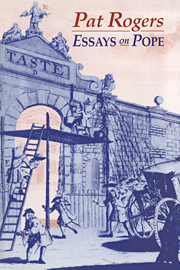Book contents
- Frontmatter
- Contents
- Preface
- Acknowledgements
- List of abbreviations
- 1 Pope and the syntax of satire
- 2 The politics of style
- 3 Form and pattern in the Pastorals
- 4 Windsor-Forest, Britannia and river poetry
- 5 Faery lore and The Rape of the Lock
- 6 Timon's Villa and Chatsworth
- 7 A drama of mixed feelings: the Epistle to Arbuthnot
- 8 The name and nature of Dulness: proper nouns in The Dunciad
- 9 Pope and the social scene
- 10 Blacks and poetry and Pope
- 11 The case of Pope v. Curll
- 12 Pope and his subscribers
- 13 The Burlington circle in the provinces: Pope's Yorkshire friends
- 14 Pope and the antiquarians
- Index
12 - Pope and his subscribers
Published online by Cambridge University Press: 18 December 2009
- Frontmatter
- Contents
- Preface
- Acknowledgements
- List of abbreviations
- 1 Pope and the syntax of satire
- 2 The politics of style
- 3 Form and pattern in the Pastorals
- 4 Windsor-Forest, Britannia and river poetry
- 5 Faery lore and The Rape of the Lock
- 6 Timon's Villa and Chatsworth
- 7 A drama of mixed feelings: the Epistle to Arbuthnot
- 8 The name and nature of Dulness: proper nouns in The Dunciad
- 9 Pope and the social scene
- 10 Blacks and poetry and Pope
- 11 The case of Pope v. Curll
- 12 Pope and his subscribers
- 13 The Burlington circle in the provinces: Pope's Yorkshire friends
- 14 Pope and the antiquarians
- Index
Summary
It is the unchallenged verdict of history that Alexander Pope achieved a major coup for the literary profession, as well as a personal triumph, with his ventures into the subscription market. J. W. Saunders calls the Homer translation ‘the success of the age’; while Pope's biographer, George Sherburn, refers in the course of a few lines to the Iliad as a ‘an astonishingly successful subscription’ and ‘so phenomenally successful subscription’ and ‘so phenomenally successful an undertaking’. Alexandre Beljame saw the Homer as a crucial watershed in the status of authorship. Not only is the dedication to the Iliad ‘a very important landmark in the history of English literature … nothing less than revolutionary’; the work itself is interesting ‘because of its brilliant financial success’ and the change of attitudes which it reflects; ‘the aristocracy of birth at last paid homage without reserve to the aristocracy of genius’. Similarly Leslie Stephen asserted that Pope ‘received a kind of commission from the upper class to execute the translation. The list of his subscribers seems to be almost a directory to the upper circle of the day; every person of quality has felt himself bound to promote so laudable an undertaking; the patron has been superseded by a kind of joint-stock body of collective patronage.’ For Stephen (and this is an important stage in his overall argument) Pope may be seen as ‘the authorized interpreter of the upper circle, which then took itself to embody the highest cultivation of the nation’.
- Type
- Chapter
- Information
- Essays on Pope , pp. 190 - 227Publisher: Cambridge University PressPrint publication year: 1993

